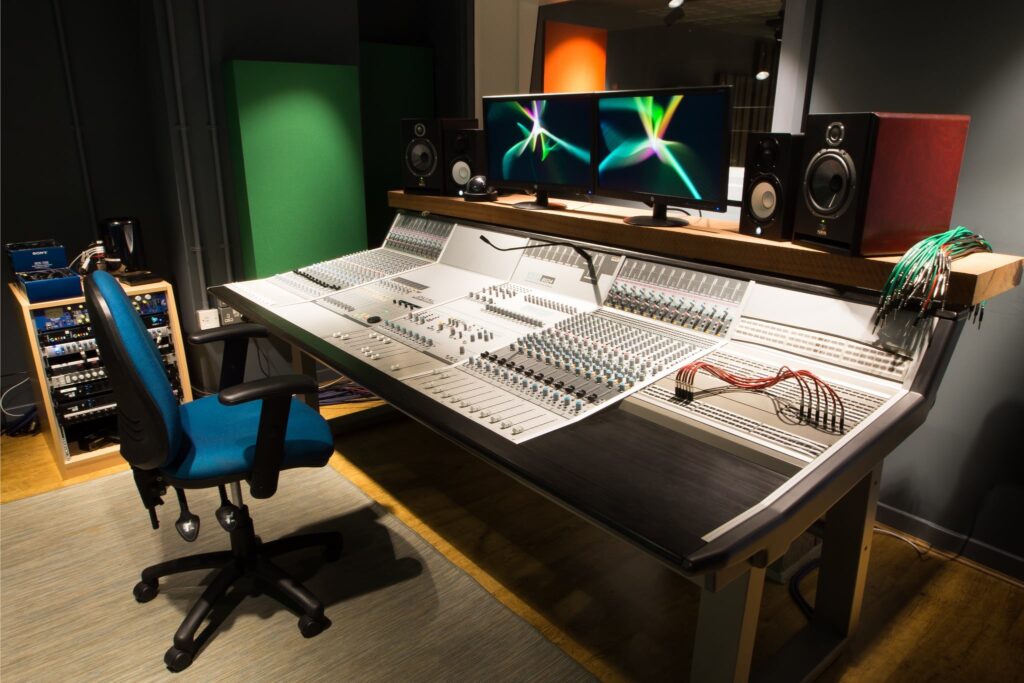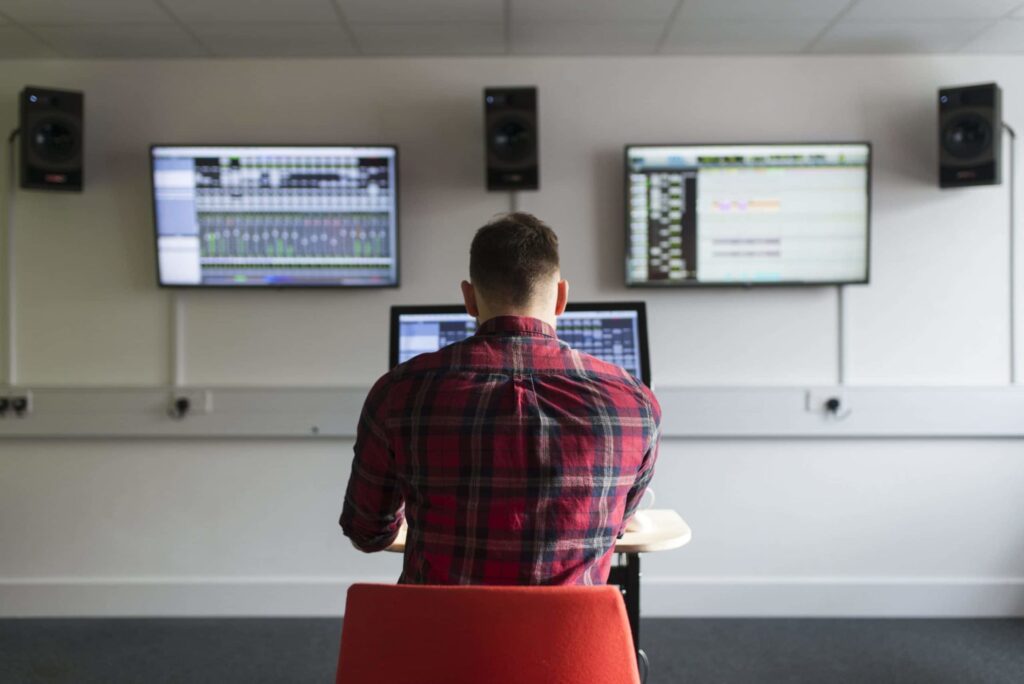BA (Hons) Commercial Modern Music - Music Production
TU CODE: TU961
Apply NowIf you are interested in creating music and sound and want to gain a degree-level qualification, and also fulfil your creative and commercial potential, then BA (Hons) Commercial Modern Music is the right choice to help turn your passion for music into a career.
This four-year programme aims to develop your technical approaches to music and sound production while at the same time progressing your career goals, using a deadline-driven project management approach.
At BIMM Dublin, we understand that the key component for music production is bringing a student’s technical knowledge and creativity to real-world, live and studio settings. To also learn the fundamentals required to collaborate with others, work with artists, and record other musicians’ sounds.
You’ll also further hone your skills by receiving tuition in modules such as Music & Listening Skills which aims to develop critical communication and listening skills for music producers and Industry Toolkit where you will develop an understanding of the skills and knowledge needed to operate as an entrepreneur within the modern music industry. You will collaborate with both the songwriting and instrumentalist streams and will also have the opportunity to upskill in your own performance skills, through a range of optional modules, if you so wish. The degree is both academically, technologically and musically challenging, providing the perfect balance between practical and technical skills and theory and analysis.

You’ll be part of a creative community of gifted writers, performers, critical thinkers and music industry professionals who you can collaborate and network with to help bring your talent to life.
Through a range of core and optional modules including (but not limited to) Live Sound Engineering, Creative Mix Techniques, Creating Sample Libraries, Digital Performance Skills, Sound Design & Writing for Media, Practical Learning & Teaching in the Creative Arts, Electroacoustic Composition, Game Sound & Music, Immersive Audio Techniques, Audio Postproduction, Interactive Music Applications, you can tailor the degree to fit your own personal goals.
Life at BIMM will stretch you as a creative, a musician and performer depending on your interests. It will also inspire you as a fan, as you attend unique Masterclasses with some of the best producers, industry professionals and musicians in the world. You’ll also have the opportunity to audition for the BIMM releases and termly BIMM gigs.
Your course will culminate in either a Professional Project utilising academic research skills or Analytical Perspectives dissertation designed to investigate your chosen stream through key concepts and theories associated with cultural studies. This will give you a head start into the workplace and enhance an appreciation and understanding of your cultural and social environment.
So, what are you waiting for? To make your way as a musician, connect with us and we’ll connect you to a life in music.

Course specification
Mode of attendance: Full-time
Length of course: Four years
Awarding institution: Technological University Dublin
Campus delivery: Dublin
TU Code: TU961
Level: 8
Language of study: English
Final award: Bachelor of Arts (Hons)
Minimum requirements
6 Leaving Certificate subjects +25s + audition*
**a minimum of 2 H5’s and 4 O6’s/H7’s are required to meet the minimum entry requirement.
Progression
Graduates can progress directly to employment in the music industry in a range of music-based industries, such as game audio industries, electronic music, the recording industry, the live music industry, the film and TV industry, the audio post-production industry and education industry.
Or they can continue their studies with a BIMM Music Institute Postgraduate Course such as MA Popular Music Practice and MA Learning and Teaching in the Creative Industries.
Course fees
BA (Hons) in Commercial Modern Music falls under the free fees scheme. To check if you are eligible for free fees, take a look at the student finance website.
Detailed information on fees is available on the registration office at TU Dublin.
Year 1
Module names and structure may be subject to change.
This module explores the planning of key performances at local, national, and international levels. Areas for study include rehearsal techniques, promotion, marketing, leadership, venues and promoters, tour management, stage management and budgeting. The unit focuses on attention to detail and explores how to make things happen at the highest level.
This module includes practical music industry knowledge that will help students plan their career. All aspects of the music industry will be covered in comprehensive detail including record deals, publishing deals, management, music synchronisation, legal issues, copyright, music teaching, live music and business planning.
This module provides the student with an introduction to the fundamentals of music theory, with practical applications of theoretical concepts on the piano keyboard. It will also facilitate the development of aural recognition and transcription skills, to better prepare the student for the range of musical situations they are likely to encounter as a professional musician.
This module will explore the fundamental principles of multi- track recording techniques covering aspects such as audio quality and microphone technique.
This module aims to provide the student with a solid grasp of the fundamentals of Music and Audio Production. Students will explore core techniques and standards within the music and creative industries and develop their ability to communicate creative and artistic ideas as well as technical specification. Students will develop critical listening skills that are essential to all areas of Music and Audio Production.
With the ever expanding popularity of live events and gigs, live sound represents an important sector of the music industry and offers many employment possibilities. This module gives you the opportunity to study the intricacies of controlling and delivering high quality audio production for the live sector. Aspects such as project management, backline, front of house and monitoring will be addressed providing you with a solid insight into professional practices and working methodologies.
This module introduces, integrates and explores music theory strategies within the context of contemporary music production. You will develop critical listening skills; discuss and develop musical vocabulary that encompasses both traditional western harmonic theory and modern music production terminology
Year 2
Module names and structure may be subject to change.
This module includes practical music industry knowledge that will help students plan their career. All aspects of the music industry will be covered in comprehensive detail including record deals, publishing deals, management, music synchronisation, legal issues, copyright, music teaching, live music, and business planning.
This module provides the student with an opportunity to consolidate, develop and apply the music theory concepts studied in Theory, Notation and Keyboard Skills.
It will facilitate further the development of aural transcription skills, along with a more detailed study of the theory behind the music, including practical applications of theoretical concepts to better prepare the student for the range of musical situations they are likely to encounter as professional musicians.
This module consists of three components or learning arcs undertaken by both the instrumentalist stream and the song writing stream.
The components are designed to be a continuation of key skills addressed in Year 1 and preparation for key skills required to enable the fulfilment of learning outcomes underpinning modules in Years 3 and 4.
The indicative syllabus associated with each component will inform and aid the development of a broad skill set and encourage a spirit of curiosity and a desire to learn among students.
The individual module components are:
- Cultural Theory, An Introduction
- Personal & Professional Development
- Research Methods, Academic Writing and Pedagogy, An Introduction.
This module will require you to explore the art and techniques of mixing multiple sources of audio, acoustic recorded or electronically generated / synthesised, into one cohesive sounding ‘mix’. The skills developed in this module will allow you to mix multi-track recorded compositions, multi-mic’d live performances and soundtracks for visual media.
Within this Module, you’ll be developing online components that reflects common workflows in the music production industry, approaches to project conception and management, digital and analogue productivity tools and the integration of critical listening skills, creativity and artistic mindsets in an audio project.
This module facilitates understanding of our listening environments and the interpretation of sound through the complexities of both physical and psychological influences. For successful music productions and live sound events, we require acoustically suitable environments alongside an understanding of how our brains interpret sound. You will study topics such as frequency, reverberation and standing waves. This module gives you the skills to design appropriate acoustic treatments utilising industry standard software and hardware for acoustic analysis.
This module will present the role of the modern Studio Engineer within the industry and discuss in detail the technology involved. Focus will be on teaching current engineering practices, applied to a variety of typical commercial scenarios, and understanding the relationship between technology and professional studio practice.
Year 3
All students take mandatory and optional modules in their third year of study.
Module names and structure may be subject to change.
This module assists musicians with ear training, transcription skills and notation. It discusses broad theoretical issues and introduces non-Western and ‘classical’ techniques of composition, analysis and performance.
In this module you will be required to create a bespoke, functional library of sounds regarding an identified gap in the market or for professional or personal use. The module will focus on relevant microphone techniques in relation to an end user as well as the desired library functionality.
This module covers the comprehensive history of popular music from 1900 to 1970, which analyses the social and political conditions that influenced the development of the art form, as well as evaluating key releases from influential artists.
Musicians undertake a research project that supports their planning for the Professional Project module. For example, a vocalist could research the techniques involved in getting a vocal sound in the studio, or a band musician planning a national tour could prepare a case study on a relevant breaking act or important venue.
This module will examine approaches to composing for a variety of moving image mediums. We will also examine workflow in relation to collecting original sound design assets to create realistic environments, while accommodating elements of Foley in the resulting soundscape.
You will explore technical processes such as recording, mixing, layering and blending sound design and Foley with musical compositions, and this will be combined with musical theory concepts to broaden your compositional capability.
This module will focus on all aspects of studio vocal production: from the technical approach, to coaching the best performance, to vocal arrangement, to post-production and mixing.
In this module, you will study the advanced techniques of music production and creative practice necessary to create genre specific tracks in areas of electronic music. Key genres will be compositionally analysed, such as Hip Hop, Microsound, Synth Pop, Grime, Ambient, IDM and many others.
This module addresses the need for modern music practitioners to be digitally literate and dynamic entrepreneurs, enabling them to directly engage with their target audience. Some of the areas covered include data collection, analytics, social media marketing, artist branding, direct email marketing, website design, marketing campaigns, digital music stores and benchmarking.
In this module, you will examine the various aspects of using music technology to plan, collaborate, and deliver a live performance from the studio to stage.
This module will familiarise musicians with fundamental issues in music publishing, including history of the industry, key concepts of copyright, collection societies, analysis of music publishing contracts, sub-publishing, and synchronisation.
It will encourage songwriters/musicians to apply their knowledge in real-world situations with their own material.
This module is about exploring and learning different models of synthesis and how these can be implemented into production projects. Students will examine the possibilities presented within these advanced avenues of music creation, enabling them to develop a deeper understanding of how creative intentions outside the realms of conventional music production aesthetics can be achieved.
In this module musicians will be placed in simulated, “deadline driven” recording session environments. They will be encouraged to attain an understanding of professional production values and an awareness of the responsibilities of the recording musician.
Year 4
All students take mandatory and optional modules in their third year of study.
Module names and structure may be subject to change.
This module presents a critical history of popular music from 1970 to the present day. Significant artists will be examined in relation to their cultural, social, and political impact and their continuing influence on contemporary music genres.
The module will also draw on theoretical contexts found in the wider discipline of cultural studies, such as critical theory and postmodernism. You will be expected to develop a sophisticated understanding of our cultural and musical antecedents and will be encouraged to analyse, synthesise and evaluate the circumstances around significant moments in the history of popular music since 1970.
This module will oblige you to engage with in-depth reading and demonstrate an appropriate level of academic rigour. You will be required to engage in critical debate with full justifications and explanations for your reasoning.
This module will introduce you to electroacoustic practices, advanced software tools and compositional strategies that will develop your creative abilities in electronic music production. You will engage in technical and aesthetic analysis of exploratory electroacoustic sound works, which will equip you with the necessary skills to make informed interpretations and appraisals.
Game sound has come a long way since the bloops & bleeps of the 1980s. Gamers now expect fully immersive and interactivity to match the improvements in graphics and gameplay.
Though there’s some overlap with film and TV sound, game sound designers need a unique set of skills. Sound effects and music need to be interactive and respond to changes and events in the game.
This module will introduce you to the challenges involved and teach you how to identify and meet them.
This module will focus on producing music through using programming language and interactive music systems. You will examine algorithmic music concepts from pioneering artists of the past and present, explore a range of interactive techniques using a range of different software and hardware.
In this module you will focus on audio post-production techniques for Film, Television and Video. You will be learning the tools and techniques utilised by industry professionals to create a sympathetic sound design for moving imagery as well as creating a clean and engaging production suitable for broadcast or online consumption.
This module ensures that students confront their responsibilities as professionals and manage a project that is rooted firmly in the professional world. Jobs in the music business vary enormously and musicians need to be adaptable and flexible in order to carve their own niche in the industry.
Final projects must be realistic and achievable and are linked with the earlier Course Planning and Research Methods modules. During the module, students will consolidate the skills and experience gained through the course of their studies.
These include industry-related skills, and research methods enabling them to analyse, interpret, and reflect upon their chosen project activity in a systematic fashion.
In the final stage of their studies, students will be able to utilise their analysis of past experience to create theories upon which to base models for future working practice.
This module will further address the musical and technological aspects of writing and producing popular songs and will include a focus on composition for the media and moving image, alongside commercial concerns and production values vital to this discipline. Musicians will continue to develop technical skills along with creative techniques common to working with sound and image.
This is an elective module aimed at students with a strong aptitude for music theory that wish to deepen their understanding of advanced theory concepts, and further develop their composition and arrangement skills through song analysis and practical application.
This module will consolidate, and develop on, the concepts covered in Advanced Music Theory and Arrangement in a project-based environment, through their application on DAWs and notational software, using sample libraries and industry-standard notation.
This module involves a thorough investigation into the music business, with detailed analysis of contracts and music business structures. There will also be high-profile guest speakers.
Musicians are encouraged to consider and facilitate their own personal and business development, an essential activity for band members, songwriters and singers alike.
The module will take students through the stages of identifying professional development needs, with specific topics covered including effective team working, stress management, time management and goal setting.
If you’re a songwriter who wants to fulfil your creative and commercial potential, then BA (Hons) in Commercial Modern Music will help turn your passion for music into a career.
Any questions?
For any questions regarding our courses or if you’d like more information on how to apply to BIMM Music Institute, please contact our Admissions Team on +353 1 5133 666 or email [email protected].

